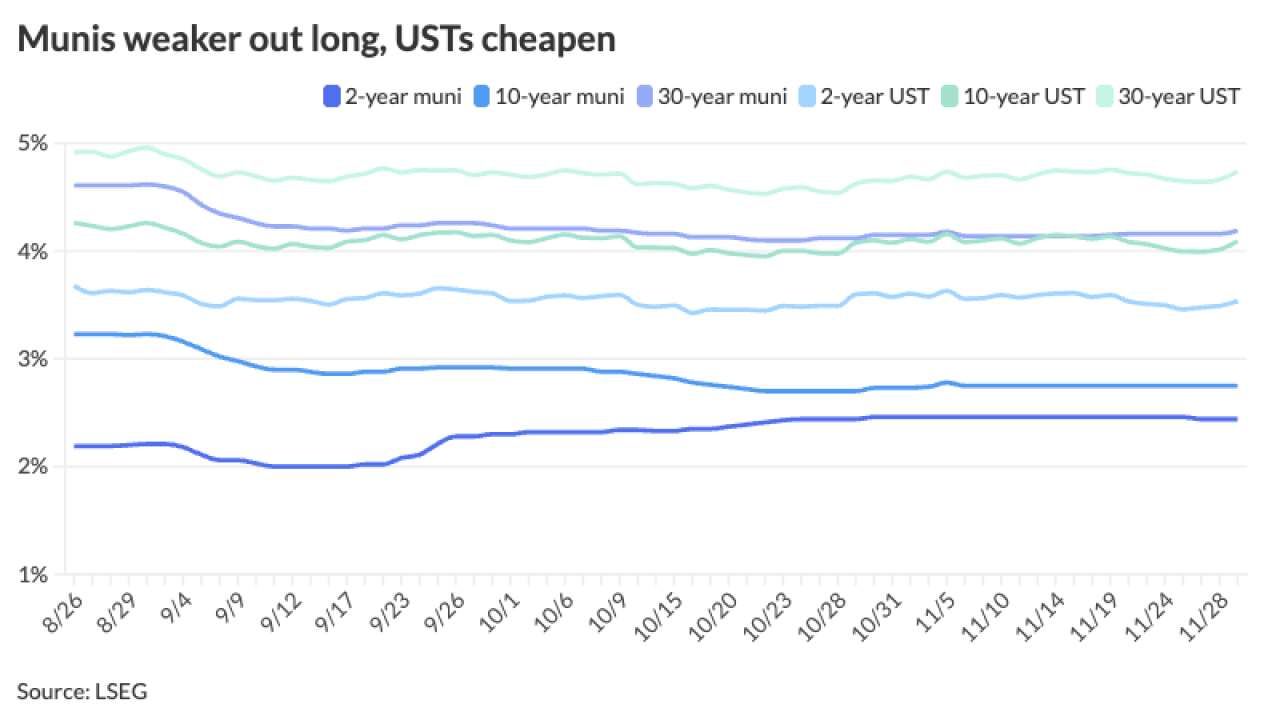SAN FRANCISCO — Victorville is in the hot seat.
The city in Southern California’s high desert is facing a Securities and Exchange Commission probe into bond sales, a grand jury investigation into its finances, and inquiries from neighboring communities about its curious bond-financing practices.
The SEC has subpoenaed three unnamed Victorville officials so far and requested 77,000 pages of documents related to bond offerings, according to the Daily Press, a local newspaper.
Victorville officials have allegedly been using proceeds from bonds sold through the Southern California Logistics Airport Authority, which the City Council oversees, to fund non-airport projects, according to city records and local media reports.
“Articles appeared earlier in the year that said [the City Council] used bond money for their library and purposes that we felt didn’t pertain to the” Southern California Logistics Airport, said Thurston Smith, a city councilman in the neighboring community of Hesperia.
Smith formerly sat on the board of the Victor Valley Economic Development Authority, whose project-area tax revenue, which includes that of Hesperia, is used to fund Victorville’s bonds.
Members of the Economic Development Authority have stepped up pressure on Victorville to provide information on their bonds, which so far has not been shared with members.
“The [authority] board has not voted for any bonds — the City Council of Victorville has been doing it and that is the member agencies’ concerns,” Smith said.
The city also faces a probe by a San Bernardino County grand jury into its finances.
Victorville has a population of 111,000 and is located in San Bernardino County, about 81 miles away — and across a mountain pass — from Los Angeles. Its population almost doubled between 2000 and 2010.
Victorville’s financial record-keeping appears to have gone amiss as the city government embarked on ventures to convert the mothballed George Air Force Base into an air cargo hub, and to construct a power plant.
In May 2009, the city hired the same embattled auditor as the infamous Bell, Calif., did — Mayer Hoffman McCann — after auditor Caporicci & Larson said it could not certify Victorville’s financial statements.
California state Controller John Chiang has accused the Bell auditor of being a “rubber stamp.”
Standard & Poor’s pulled its ratings on Victorville’s debt in April 2009 after Caporicci & Larson declined to certify the city’s financial statements for 2007 in a report released a month earlier.
Caporicci said the statements may be “materially misstated and may not represent fairly the financial position and respective changes in financial position of the city.”
Victorville, the Victorville Redevelopment Agency, and its related enterprises reported more than $474 million of long-term bonds and certificates of participation in the 2009 comprehensive annual financial report.
Its general fund revenues are about $45 million a year.
The bulk of the debt was issued by the airport authority to fund redevelopment of the decommissioned George Air Force Base into a multimodal transportation and distribution hub for Southern California.
Moody’s Investors Service recently downgraded $50 million of the airport agency’s subordinate tax-allocation revenue bonds to Ba3 from Ba2 and left it on watch for another possible downgrade.
The rating agency also affirmed its Baa3 on the airport authority’s housing bonds, which are secured by set-aside incremental revenue, and kept it on watch for a further downgrade.
Moody’s said the annual incremental tax revenues are no longer sufficient to cover debt service. Analysts noted that the most recent debt service was paid in full by relying on previously collected revenue.
“For 2012 and beyond, significant uncertainty remains about the agency’s ability to meet all debt-service requirements if the assessed value does not begin to improve in the near term,” Moody’s analyst Kevork Khrimian said in the December note.
Keith Metzler, Victorville’s director of economic development — who oversees the redevelopment agency, the airport, and city business development — did not return a call for comment.
Metzler is also executive director for the Victor Valley EDA, which is the joint-power redevelopment authority that oversees the project area from which tax revenues are collected to secure the bonds.
Victorville spokeswoman Monica Petersen replied to questions from The Bond Buyer via e-mail.
In response to inquiries about the recently downgraded debt, she said the city made the debt-service payments in December and has no reason to believe it won’t make its payments in June. Petersen also confirmed that the SEC investigation is ongoing.
The federal regulator has recently increased its focus on municipal bond disclosure.
The SEC charged New Jersey with securities fraud in August for failing to disclose to bond investors that it was underfunding its two largest pension plans. New Jersey settled the case without admitting or denying the commission’s findings and said it would not transgress again. There was no fine.
Victorville’s woes also appear to be self-inflicted.
The Daily Press has obtained city records indicating that Victorville spent money on city-related projects generated from a 2005 bond sale by the airport.
The bond sale’s official statement said the airport authority would “use the proceeds of the sale of the bonds to finance certain public capital improvements benefiting the Southern California Logistics Airport.”
However, the city spent $1.8 million of the proceeds to buy land across from Victorville City Hall.
Victorville estimates it spent more than $48 million in bond proceeds from the deal, even though only $42 million was allocated, according to city records.
The local newspaper found during an investigation in October that a quarter of $300 million in bond proceeds were used to fund Victorville’s own projects outside of the airport, including a library and power plant.
Neighboring cities have also pressed Victorville officials for answers about its bonds.
In a Jan. 3 letter to Metzler, Hesperia city manager Mike Podegracz, whose city is also a member of the Victor Valley EDA, asked for detailed information about debt-service payments, reserve requirements, and defaults on bond covenants.
In a letter dated Jan. 30, Metzler said he would comply with the request within 30 days.
He said EDA members are allowed to issue debt using the authority’s tax-increment revenues as security without getting consent from the authority itself.
No other members have issued bonds using the airport authority’s tax revenue, according to Smith, the Hesperia council member.
Victorville’s finances have been tight due to a decline in tax allocations since a major housing bust during the economic downturn.
Khrimian said the 14-square-mile project area that is tied to the authority’s tax revenue has experienced some of California’s steepest declines in property values. They have dropped more than 60% since 2007.
The airport authority bonds are backed by tax-increment revenue from a redevelopment area within a project area established by the Victor Valley EDA to promote growth around Victorville and the airport.
The city dominated the project area and its economic expansion before the recession, its population almost doubling from 60,000 in 1994.
Victorville’s $17,555 per-capita income is 35% shy of the U.S. average, according to the Bureau of Labor Statistics. It had a 16.7% unemployment rate in November on an unadjusted basis. That compares with a 12.4% unadjusted jobless rate for all of California in the same month.
The Victor Valley EDA is responsible for much of the expansion. It was founded in 1989 following the announcement of the closure of George Air Force Base, now the SCLA.
In 1997, the airport authority was created by the EDA, which then assigned control of the airport to Victorville.
Nine sub-areas under control of the EDA pledge half of their tax increments to debt service, net housing set-aside, and senior pass-throughs, while Victorville has pledged all of its available tax increment to debt service.





